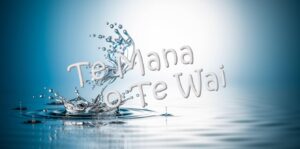Background:
I wrote a heap of lines on what I thought the background to the reforms were, but when I got deeper and deeper into it, I lost the will to live and deleted the lot.
Everything about the design of 3 Waters is faulty. The numbers on which the structure is based are questionable at best. The governance structure is anti-democratic. The financial structure is dangerous. The payment to local government for their infrastructure is theft (CCC has $6b worth of assets and $1.1b worth of debt and it’s over to the Minister to decide how much debt is taken by the proposed. As payment the last figure I heard was that CCC would receive $122m, I’m not sure whether this is still the number).
Basically, the design of 3 Waters is the worst piece of legislation I have ever seen.
A poll last week showed that of the sample of voters interviewed only 19% supported the 3 Waters legislation. That is a dismal result. The flooding in Auckland and Northland has demonstrated that stormwater is completely supported by land planning. That parks and streets are an essential part of stormwater systems and is the new system designed to take all these facilities off local government as well?

Here’s a graphic of how I think the “negotiations” have gone between central government and local government with the design of the 3 Waters legislation. Local government is the child in the upturned basket and central is represented by the parent:
Let us analyse this picture
The limitations to how far the child can move was designed by vested interests, i.e., consultants employed by Infrastructure and Water NZ and adopted completely by Internal Affairs.
The lid above the child, i.e., the constraint from escaping into other places was approved of by the father, (central government), and designed by consultants and Internal Affairs and agreed to by Local Government New Zealand who let their whole sector down badly.
The father, i.e., central government, does not understand the need for partnership with the child, the necessary toys it should have, or its potential. Other things are more important in the parent’s world.
Then along came other people who had ideas on how to manage the child in a positive manner. So that the cage imposed on the child could be removed which would enable it to thrive and become nurtured by all those around them.
Then the parent put their foot down and insisted that the child was to stay in their confined space because it was their responsibility to be in control.
Here ends today’s parable.
Any solution must take account of the following

- The Future of Local Government Reforms – Their review has come out of deep consultation around the country and is pointing creative ways forward.
- Mana whenua at the table as equal partners, including hapu – not just iwi
- The Mana o Te Wai – Four Waters: it is more than pipes we need to address the needs of our catchments and aquifers, not just the pipes
- Creative funding options – how can this work. Everything is groaning for money to be spent on hospitals, health, education, infrastructure – how can we make this work?
The whole design of the new structures, their almost absence of accountability and the financial base on which it is designed needs to be rethought. We need to build a strong consensus of the way forward.
It’s time for peace pipe smoking time. For everybody to sit back and quietly reflect on what could be possible and just what people could live with. Then the support for change might be greater in the general population than 19%.
I totally agree with this, but I’ve become very reticent to say much on the matter more recently. Even family members (who know my thoughts on the 3Waters reforms) have taken me to task for my stance and cannot understand at all where I’m coming from, even though I’ve supported my arguments with facts. They just worry that I’ve fallen down some RW rabbit hole. Same for people whose views I largely agree with on social media (mostly left leaning). If one speaks out against any aspect of 3Waters one is viewed as being racist and/or a right wing National/ACT supporter, or worse. It’s quite depressing and I really don’t know what the answer is, apart from the hope that under Chris Hipkins’ review, the worst aspects (funding and financing mainly, and problems regarding stormwater management) will be changed to a democratic, fiscally safe model.
I somehow doubt that the financial model will be looked at again and it if goes ahead under this model I fear NZ could be left in a very precarious position in decades to come. And how does it work for management of stormwater in these precarious times, if all our parks and roads etc end up within the 3Waters framework as well?
Unfortunately the 3 Waters debate got entangled with anti-vaxers.
The issues are quite different. Tell your family that you haven’t gone down a rabbit hole. Remind them that in the latest poll the number of NZ’ers who support the legislation is 19% of the sample.
Remind them that CCC has $6.9b worth of water assets and has $1.1b worth of debt on them. The government offered $122m for them. I’m unsure whether this is the final figure. It’s theft on a grand scale and the accountability of the new structures is virtually zero.
Thanks Garry. I have essentially told them all of that, but it does seem to me that many (most?) Labour supporters cannot see past the current model and refuse to critique it in any way at all. It’s not at all helpful at the moment and I know I’m not going to win any debate with my family members – they’re far more highly educated than I am and so – what would I actually know? 🙂 They live in Welly and have been very upset about the state of Wellington’s infrastructure – and rightly so.
Stormwater management is going to be particularly important and it’s vital that we get it right, especially after what Gabrielle has been dishing up to us over the last few days.
tell me Garry how much was paid the drainage board when the council took over their assets in 1989. Was there a poll of ratepayers to see if they agreed with the amalgamation of the drainage board into CCC which was a long held goal of council politicians.
Drainage boards were originally established because the early councils weren’t doing the work on wastewater in the formative years of this country. History is repeating itself with the same charge now leveled against councils after they swallowed up drainage boards. Government already funds so much of the council’s work it’s a fair trade. A lot of the infrastructure was built in the first place by central government and simply handed over because the ratepayers do not want to pay for those billions of dollars of assets.
Councils are not dealing with the hard issues on flooding, they do not have the money or the power, it will fall onto central government to have to deal with this stuff. We know that’s the truth, If the council gets to the point where they actually don’t want to do something they will claim it should be dealt with by the government. Using an example in the city, the council has washed its hands of dealing with the homeless problem which requires specialised services to be funded. I didn’t see any attempt last week to provide these when they closed down a homeless camp in a wealthy neighbourhood. Still waiting for an answer from the council on whether they actually fund any homeless support services.
Here for example you have that the council tried to address sea level rise to stop people rebuilding at Southshore, then they rolled over pretty quickly on that.
Saying that the 3 Waters is wrong because councils should have control of stormwater because of integrated management, is wrong when councils are constantly passing the buck on pollution control in stormwater. They have done a good job of building the detention dams to hold back floodwaters from the rivers but are still allowing sewage to be dumped in them as well as polluted stormwater, we lambast the farmers for polluting the big rivers with runoff but our city rivers are some of the most polluted in the whole country.
Solution is a separate water services entity – clearly in Auckland the Watercare service model gets things done. Whilst we’re about that, public transport across this region should also go back into a separate entity. Auckland leads the way there as well.